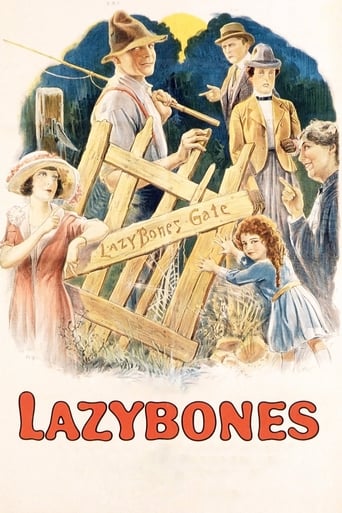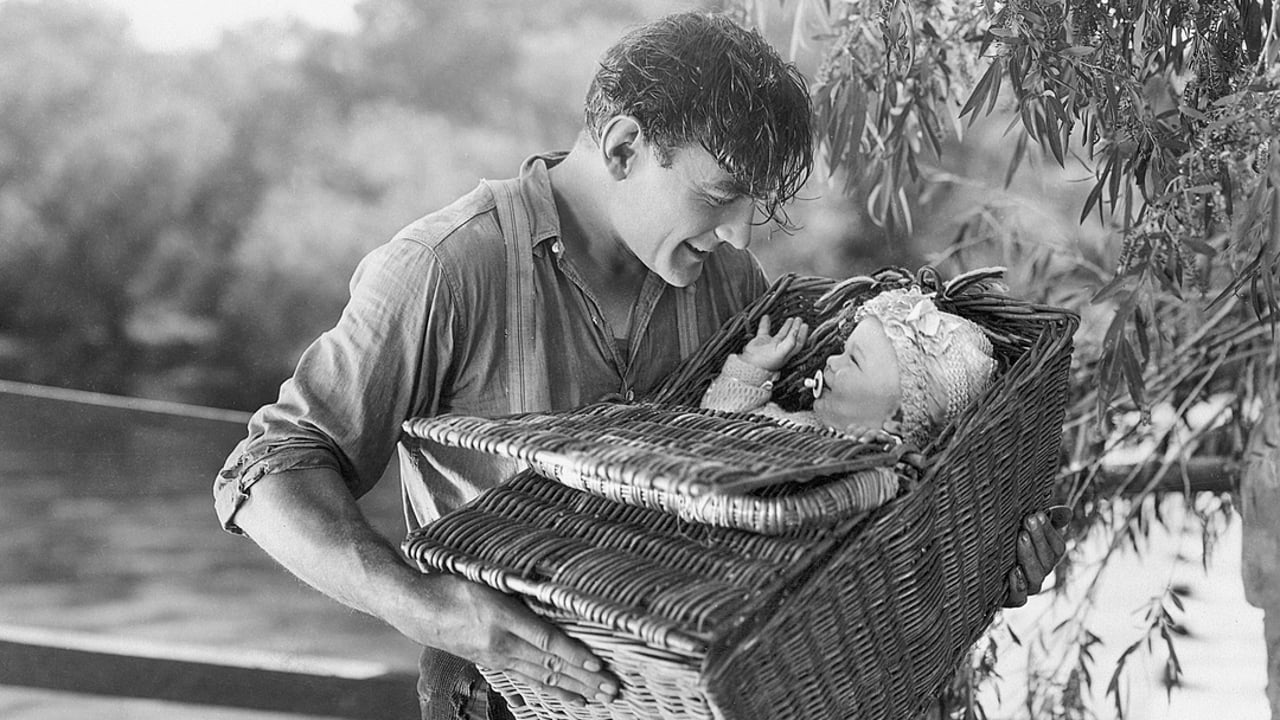drednm
Buck Jones is a huge surprise in this 1925 silent, playing a rural man who lives with his mother (Edythe Chapman) and is known as Lazybones. Frank Borzage's delicate film (beautifully shot) shows the true of a man no one really knows. He sits around and fishes, neglecting chores and a local girl (Jane Novak) who is in love with him, much to the relief of her battle-axe mother (Emily Fitzroy).The one day, her sister (Zasu Pitts) returns from the city, where she was married to a sailor who has been lost at sea. She also has a baby. Knowing that no one in small-town America will believe she had been married, she sets down the baby and jumps into the river. Lazybones sees her and jumps in to save her. She tells him her story and they concoct a plan whereby he will claim to have found the baby and she can return home alone in a few days.Of course the town turns on him and the baby girl, but Lazybones holds to his promise while Pitts is consigned to marry a local jerk. Even the sister turns on Lazybones and says she'll never speak to him again. The years pass.As World War I approached, Lazybones goes off the war while the baby Kit (Madge Bellamy) is now about 15. Lazybones inadvertently becomes a war hero and returns to a town that has still never quite forgiven him. Kit now has a boyfriend (Leslie Fenton). Lazybones realizes he is in love with Kit and just as quickly realizes how many of their lives have changed over the years.Jones is terrific. He usually starred in Westerns and for a time rivaled William S. Hart in popularity. Here he has a chance at a part that requires a delicate mix of drama and comedy. Zasu Pitts is fantastic as the tragic Ruth. Best know for her fluttery old maids, here she turns in a solid dramatic performance. Also good are Bellamy, Novak, and Chapman. A special word is needed for Fitzroy, who along with Josephine Crowell, ranks among the major battle-axes of the silent era.A final word on Buck Jones. He was still going strong in 1942, starring in B Westerns when he was caught in the famous Coconut Grove fire in Boston. He died two days later.
theskulI42
My first entry in the sudden Borzage/Murnau double-quest I've been thrust into by receiving the behemoth collection that bears their names was this forgotten 1925 melodrama with the title that sounds like a slapstick comedy: Frank Borzage's Lazybones.The film concerns a dude named Steve (Buck Jones) that just lays around all the time, and his one activity is fishing, which involves him laying around all the time. Needless to say, he has acquired the nickname "Lazybones". He's sweet on a girl named Agnes (Jane Novak), whose evil mother (Emily Fitzroy) forbids her to go with him, and has arranged a marriage for her abroad student daughter Ruth (Zasu Pitts) with "the local Beau Brummel", Elmer Ballister (William Bailey). But while doin' jacksh-t, Steve runs into Ruth upon her return, with an infant and a story: she married a seaman in secret because she knew her mother wouldn't approve, she had a child, and then he went off to sea, never to return. Steve offers to claim he found the baby in the reeds until Ruth's ready to tell her mother, but when Ruth's mother whips her and threatens to send the child away if Ruth tells anyone, Steve ends up keeping her and raising her himself. From there, the film fast-forwards episodically to the child, named Kit (Virginia Marshall, later Madge Bellamy) as a young girl, as a teenager, and as a young woman in 1917, and Steve finally has to do something, and gets shipped off to war.The film is a fairly dour affair all around, no one is content, no one is satisfied, no one is happy, and it pretty much stays that way. Their one recurring gag, how every single person that enter's Steve's house, from grandmother on down to adopted daughter, runs into the stubborn gate and yells, "Darn that gate!", isn't really that funny, but it's one of the few moments of lightheartedness in the entire piece, and even then, it's used as a heartbreaking mile-marker motif later in the film when he gets sent off to war. Actually, one into the trenches of Europe, the film turns to outright slapstick as through dumb luck, he becomes a national hero.But the film takes a weird turn once he returns home from the war that made me sort of lose all sympathy for Steve and sort of soured the dramatic weight of the film: he falls in love with his adopted daughter. Despite the fact that he has raised this girl from the time she was still forming kneecaps, and he has been her singular parental guardian, and yet we're supposed to feel sad when he comes back for war and wants to do things that, had they been related, would have been illegal and are taboo to depict, even now? No thanks. I'm glad this collection is mostly Borzage (only two of the twelve films in the collection are from Murnau), because of the two I've seen (this and Moonrise, I've been pretty much underwhelmed.{Grade: 6/10 (C+) / #6 (of 6) of 1925}
imogensara_smith
In a review of Moonrise (1948), I asked what I thought was a rhetorical question: did Borzage ever direct a film that wasn't about the redemptive power of love? Then I saw Lazybones, a deceptively low-key film that quietly suggests that love and sacrifice are not always rewarded, that relationships can be destroyed permanently by lack of trust, and that people's characters just don't change. I always associated Borzage with miraculous, credibility-straining happy endings in which people return from the dead, recover their ability to walk, or at least forgive and forget past misunderstandings in sublime romantic union. I don't want to spoil the ending of Lazybones, but I will say: this film doesn't go where you think it's going. It's not a tragedy, nor a melodrama, but a sustained, tender look at a group of people whose lives are more like those of real human beings than of Hollywood movie characters.Charles "Buck" Jones plays Steve Tuttle, nicknamed "Lazybones." He is introduced by a symbolic shot of molasses pouring slowly over pancakes; then we see Steve snoozing with his feet up against a fence, where they have been so long cobwebs have formed at his toes. We seem to be in the realm of quaint rural comedy. Steve has an ever-loyal mother and a beautiful girlfriend named Agnes (Jane Novak), whose gargoyle of a mother, naturally, doesn't approve of this good-for-nothing. The movie starts slowly with light humor, in a beautifully realized turn-of-the-century setting. Then Steve rescues Ruth (Zasu Pitts), a young woman who throws herself into the river in a suicide attempt. She has a baby from a secret marriage, her husband is deadand she's Agnes's sister. Steve offers to take the baby home, and of course no one believes that he found it; they assume it's really his. Agnes says she will never speak to him again.What we expect now is some comedy about a man trying to deal with a baby, before a few revelations and a happy denouement. Instead, the story starts to leap ahead in time, as baby Kit becomes a little girl, teased by her schoolmates and ostracized by the town for her questionable parentage, then a teenager in overalls. Steve continues to be shiftless and lazy; Ruth is unhappily married against her will to a pompous dandy. World War I breaks out, and when Steve returns, after inadvertently becoming a hero, he sees the beautiful young woman Kit has become andrather disturbinglyfalls in love with her. By this point, all the expectations aroused by the conventional storyline have gone out the window.Lazybones is a small-scale film, but it's exquisitely crafted, from the clever and handsomely illustrated title cards to the visual wit with which sequences are connected. I can't think of a silent drama more subtly acted; every performance is natural, delicate and underplayed. I've never seen Buck Jones in his cowboy persona, but it was a wonderful inspiration to turn this big, square-jawed lug into a gentle, dreamy, wistful character. Without any overt emoting, he gives an affecting performance as a man of innate decency but curious passivity. He shades ever so subtly from youthful promise (he'll overcome his laziness and make good, we assume) to a still likable but saddened, almost stunted middle age; he realizes he's missed his chances, yet his life can't be seen as wasted. The delicate ambiguity of this character development is more reminiscent of Japanese cinema than Hollywood.Zasu Pitts uses her huge mournful eyes and thin, sickly face to powerful effect in the tragic role of a woman forced to watch her child grow up without knowing her. The mother of Agnes and Ruth is the only character who is less than nuanced. Borzage seems to have had an obsession with abusive women: like the mother in Lucky Star and the sister in Seventh Heaven, Mrs. Fanning wields a whip against a helpless waif. Virginia Marshall, who plays the young Kit, is striking and not a bit cloying. Madge Bellamy is reminiscent of Mabel Normand in her tomboyish teenage scenes, and brilliantly nervous and embarrassed in a scene with her dying mother. Towards the end of the film, her chocolate-box prettiness takes the edge off Kit's appealing outcast character.Lacking a transcendent romance at its center, Lazybones highlights Borzage's interest in outsiders, social rejects, people who create their own world because they can't fit into the mainstream. Refreshingly free of clichés or easy answers, it's a tender miniature that makes an unexpectedly strong impression.
FerdinandVonGalitzien
"Lazybones", directed by Herr Frank Borzage was the beginning of this director's most fruitful period in the silent era. Like Herr Borzage's other most important and remarkable silent films,"Lazybones" was produced for Fox. "Lazybones" tells the story of Steve Tuttle ( Buck Jones ) "a man as slow as molasses in winter" so the people gave him the nickname of "Lazybones" a man with many unrequited loves that he will sacrifice in a languid way true to his character. The film combines a refined sense of humour with a kind of melancholy melodrama developed by excellent actors who are perfect in their different characters. Buck Jones was mainly famous for his cowboy roles ( And Borzage himself was also noted for his early westerns ). Steve's opposite is JaneNovak (Zasu Pitts) , a victim of her strict mother, and who is a fragile character with little chance for rebellion in a town where convention rules and keeping up appearances is a very important matter.In this film nature and the landscapes are very important too and become subtle characters in their own right. They sometimes reflect the different moods or the special way of life of the different characters of the film, ( sunny, idyllic and carefree for Lazybones and unsettled and windy for the women ). The decisive importance of the background shows an European influence, especially from the Danes and Swedes. The film is also an excellent example of the Herr Borzage mastery of storytelling and pacing. Technical effects, flashbacks and camera movements are combined in such an imperceptible manner that the audience can feel and sense the inexorable passing of time in an elegant, sad but beautiful way
,this German count, who lacks some of the common human feelings, still thinks that makes for poetry, doesn't it? And now, if you'll allow me, I must temporarily take my leave because this German Count must go stretch.Herr Graf Ferdinand Von Galitzien


 AD
AD

